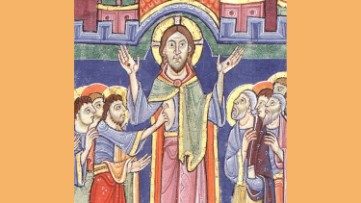St. Thomas, Apostle

With the Lord
Jesus “appointed twelve,” the gospel of Mark says, “that they might be with him” (Mk 3:14). We know nothing of Thomas’ life before the Lord called him, but we do know that the call resounded in this Jewish man’s life as nothing before or after it. We know, too, that this call worked in him for the rest of his life, ultimately leading him to the ends of the earth.
The first time that we hear from Thomas in the gospels, he exhorts his fellow disciples to accompany Jesus to Bethany, near enough to Jerusalem to be hostile territory: “Let us also go to die with him” (Jn 11:16). He was a man who loved his Master, then, and a man of courage. But above all, he was a man whose life was marked by the most inconceivable event in the history of the world: the Resurrection of his Lord.
A mistake, and the mercy of God
Thomas made one mistake that is recorded in the gospels, and it was not first to doubt. It was to be absent from the assembled Church on the evening of the Resurrection. Thomas was alone, without the protection of his brothers, and so all the fragility of our human nature in the face of death and pain is revealed in him.
His Lord had died. Thomas knew this; it filled him with a grief greater than his comprehension. He must have thought: after so brutal a death, after so definitive a sealing of the tomb, there can be no more life. Not for the Lord, not for him, not for any of them. “So the other disciples said to him, ‘We have seen the Lord.’ But he said to them, ‘Unless I see the marks of the nails in his hands and … put my hand into his side, I will not believe’” (Jn 20:25).
But a week later, when Thomas was at last with the brethren, the Lord had mercy on the unbelief in this fragile, wounded, doubting, courageous and loving disciple. “Put your finger here and see my hands, and bring your hand and put it into my side….” Thus it was granted to Thomas to utter, for himself and for all believers after him, the clearest confession of Christ’s divinity in the Scriptures: “My Lord and my God!” (Jn 20:28).
A luminous morning
The clear, luminous shock of fingering those wounds became the clear, luminous morning that engulfed the Sea of Tiberias and seven of the apostles, Thomas included, on a morning shortly thereafter. The apostles had gone fishing and, after a fruitless night, a mysterious man on the shore had occasioned an impossibly large catch of fish. He beckoned them to breakfast – the simplest, most quotidian of all the Resurrection scenes. As he handed them fish and broke the bread, the Scripture says, “None of the disciples dared to ask him, ‘Who are you?’ because they realized it was the Lord” (Jn 21:12). Again, Thomas had his eyes, ears, all his senses filled with the mercy of God.
Confession
Thomas had seen death overcome by the radiant power of God’s life, and so he could not longer doubt or fear. Moreover, nothing could separate him now from unity in faith and love with his brethren, not even when the apostles scattered to the ends of the earth to bring this new life in Christ to all men. Thomas went east, first to the Persians, then to Jewish settlements in far-away India. From those settlements, tradition has it that he eventually reached the Malabar coast (present-day Kerala). There, the “St. Thomas Christians” trace their origins to the apostle whose mission, as St. Ephrem the Syrian wrote in the fourth century, was to “espouse India to the Only-Begotten.”
It was not doubt that signed the life of this apostle so much as the fact that he was overwhelmed, overcome by the light of the Resurrection. It was in this light that, in the year 72 A.D., he was martyred in Chennai, India. Thomas once confessed Christ’s divinity with his lips. There, he confessed with his life. He did as he once exhorted his brethren: he went so far with the Lord as also to die in him. St. Thomas’ feast day is celebrated on July 3.







